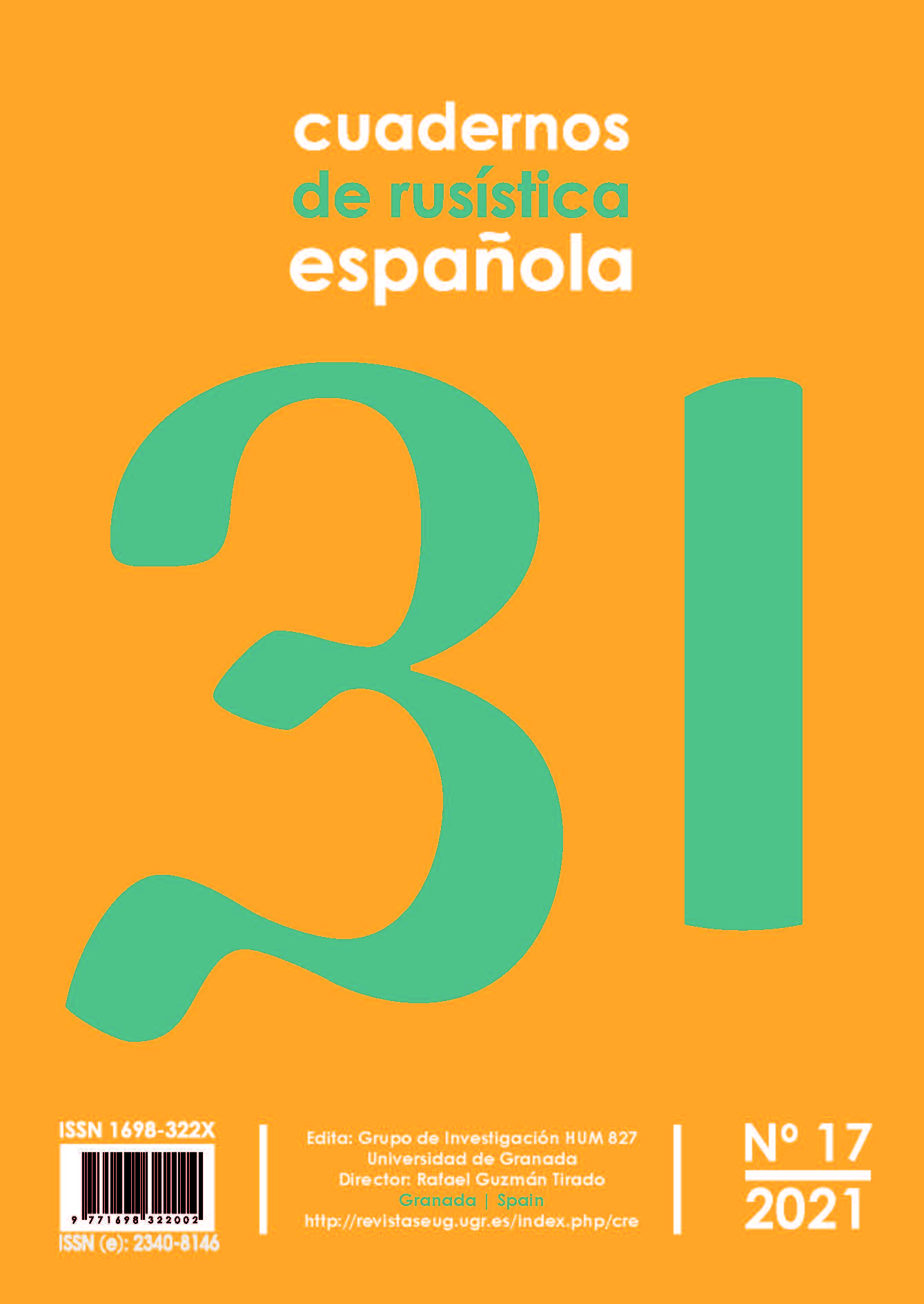Formation of Communicatives from Rhetorical Questions
DOI:
https://doi.org/10.30827/cre.v17.20929Keywords:
dialogue, communicatives, grammaticalization, rhetorical questions, discourse strategies, polemical discourseAbstract
The article is devoted to communicatives, grammatically vague response tokens, pointing to the prior utterance in dialog: «Malo li», «A to», «A to net», «A to kak zhe». Often, these tokens are used in some competitive types of Russian discourse. Communicatives serve as signals of the speaker’s communicative intentions in talk-in-interaction. The tokens under analysis derive from special syntactic constructions — rhetorical questions and echo-cues. The transition of syntactic constructions into the domain of communicatives takes place when they realize special discursive strategies of objection, disagreement and confirmation, agreement. We analyze the transition stages using methods of grammaticalization. The syntactic constructions tend to lose its elements, become idiomatic and acquire expressive connotations been used stereotypically in talk-in-interaction. The special point of interest is to discover the ways a speaker humiliates the addressee in controversial dialogues. The article contributes to the theory of grammaticalization, communicative interaction and politeness research. The results of the analysis may be useful for foreign students of Russian.
Downloads
References
Arutyunova N.D. (1970): Nekotorye tipy dialogicheskih reakcij i «pochemu»-repliki v russkom yazyke. Nauchnye doklady vysshej shkoly. Filologicheskie Nauki. 3, 44-58. Moskva.
Balli SH. (2011): Francuzskaya stilistika. Moskva. Gosudarstvennoe izdatel'stvo inostrannoj literatury.
Bousfield & D., Locher, M. eds. (2008). Impoliteness in language: Studies on its interplay with power in theory and practice. Berlin and New York: Mouton de Gruyter.
Bragina N.G., Sharonov I.A. (2019). Pedagogicheskaya» agressiya v russkoj bytovoj kommunikacii. Russian Journal of Linguistics. Vol. 23 No. 4, 975 – 994.
Bulygina T.V., SHmelev A.D. (1997). Dialogicheskie funkcii voprositel'nyh predlozhenij. Yаzykovaya konceptualizaciya mira. SHkola «Yаzyki russkoj kul'tury». 263-270. Moskva.
Coulmas, F. (1981) Introduction: Conversational Routine. Conversational Routine: Exploration in standardized communication situations and prepatterned speech. 1-18. The Hague: Mouton 1981.
Culpeper, J. (2011). Impoliteness. Using Language to Cause Offence. Cambridge UP.
Eelen, G. (2001). A critique of politeness theories. Manchester: St. Jerome Publishing.
Issers O.S. (2002). Kommunikativnye strategii i taktiki russkoj rechi. Moskva. Editorial URSS.
Kustova G.I. (2011). Kosvennyj rechevoj akt voprosa kak sredstvo rechevoj agressii i negativnoj ocenki v russkoj razgovornoj rechi. Voprosy kul'tury rechi. Vyp. 10. 229–235. Moskva. AST.
Larina T.V. (2013). Anglichane i russkie: yazyk, kul'tura, kommunikaciya. Yаzyki slavyanskih kul'tur. Moskva.
Lehmann, C. (2004). Theory and method in grammaticalization. Zeitschrift für germanistische Linguistik, 32 (22), 152–187.
Nikolaeva T.M. (1990). O principe "nekooperacii" i/ili o kategoriyah sociolingvisticheskogo vozdejstviya. Logicheskij analiz yazyka. Protivorechivost' i anomal'nost' teksta. 225-235. Moskva. Nauka.
Ozhegov S.I. (1991). Slovar' russkogo yazyka. Moskva. Russkij yazyk.
Paducheva E.V. (2009). «Malo li kto» i drugie konstrukcii s implicitnym otricaniem. Konstrukciya «malo + S.gen». https://docplayer.ru/28670-E-v-paducheva-malo-li-kto-i-drugie-konstrukcii-s-implicitnym-otricaniem-konstrukciya-malo-s-gen.html (data obrashcheniya 12.11.2020).
Sharonov I.A. (2012) Kommunikativy v grammatike i v slovare. Russkij yazyk segodnya. Vyp. 5. Problemy rechevogo obshcheniya. Sb. dokladov. In-t russkogo yazyka im. V.V. Vinogradova RAN. Nauka. 448-462. Moskva. Flinta:
Sharonov I.A. (2015). Poisk i opisanie kommunikativov na osnove nacional'nogo korpusa russkogo yazyka. Metody kognitivnogo analiza semantiki slova: komp'yuterno-korpusnyj podhod. 145–187. Moskva. Yаzyki slavyanskoj kul'tury.
Shvedova N.YU. (1960). Ocherki po sintaksisu russkoj razgovornoj rechi. Moskva. AN SSSR.
Traugott, E. C. (1995). Subjectification in grammaticalisation. Subjectivitiy and subjectivisation. Cambridge: Cambridge University Press.
Yokoyama, O. (1990). Responding with a question in Colloquial Russian. Yokoyama, O. (ed.) Harvard Studies in Slavic Linguistics, vol. I, 175-194. Harvard University Slavic Linguistics Colloquium: Cambridge, MA.
Zemskaya E.A. (1994). Kategoriya vezhlivosti v kontekste rechevyh vozdejstvij. Logicheskij analiz yazyka. Yаzyk rechevyh dejstvij. 131-136. Moskva.












